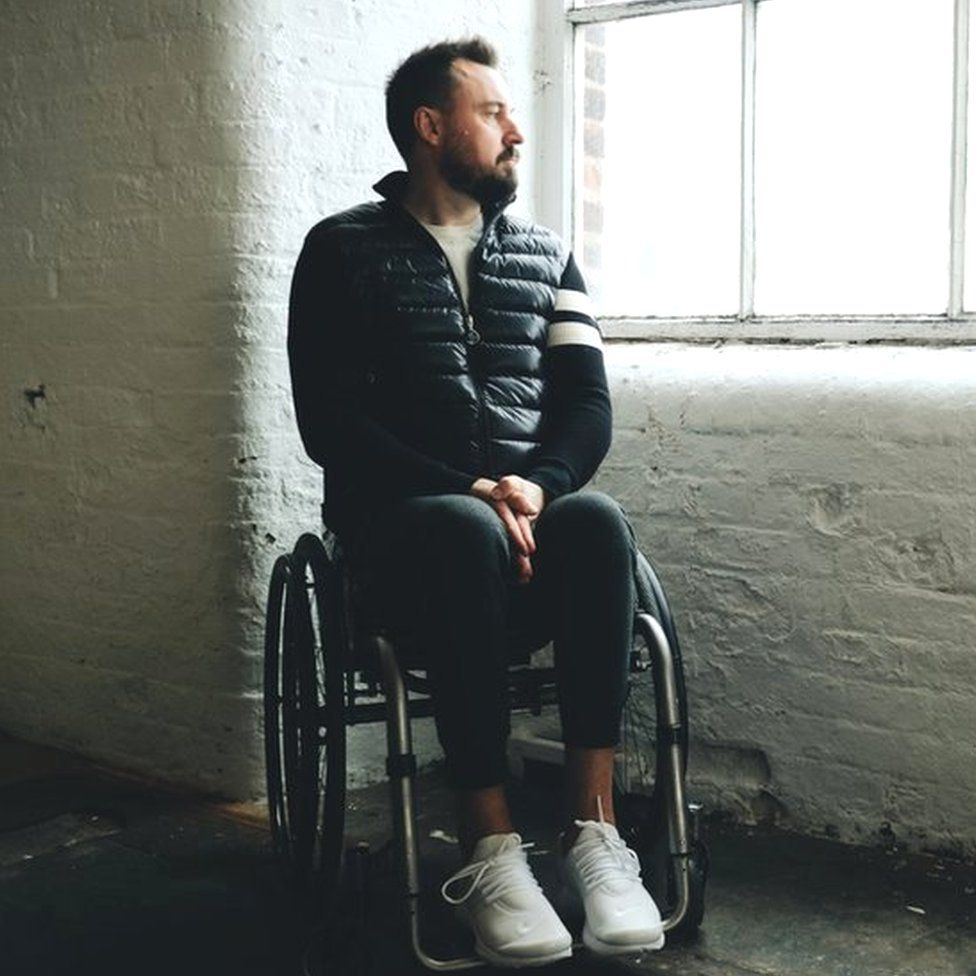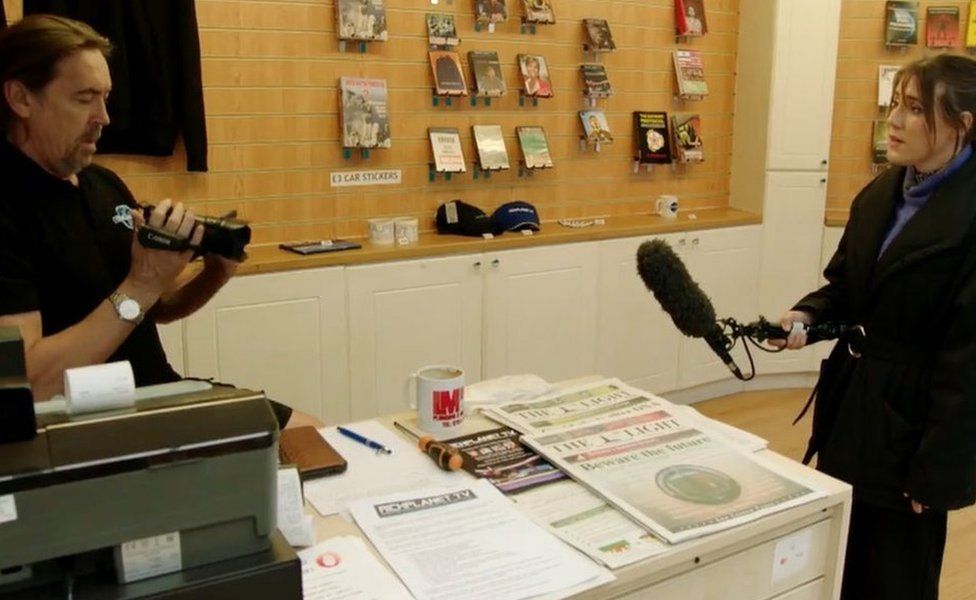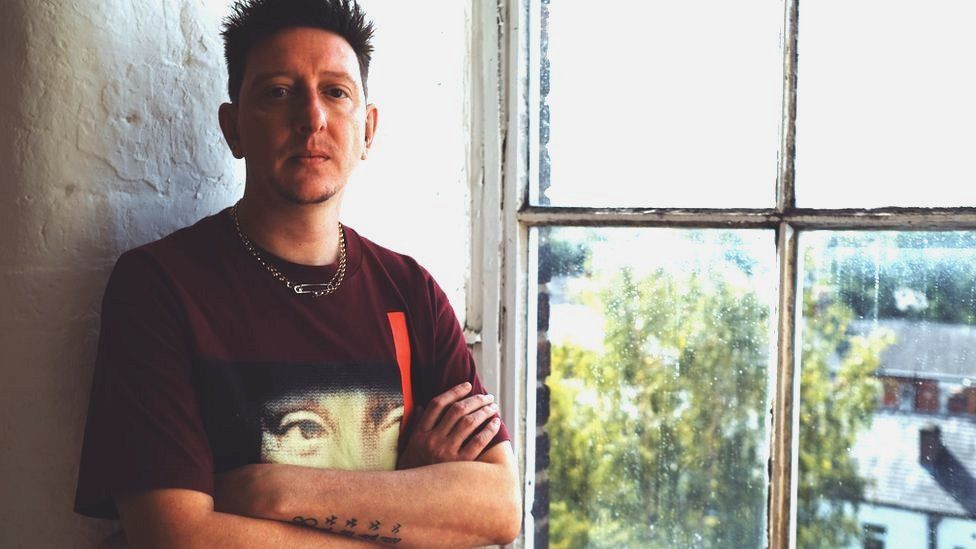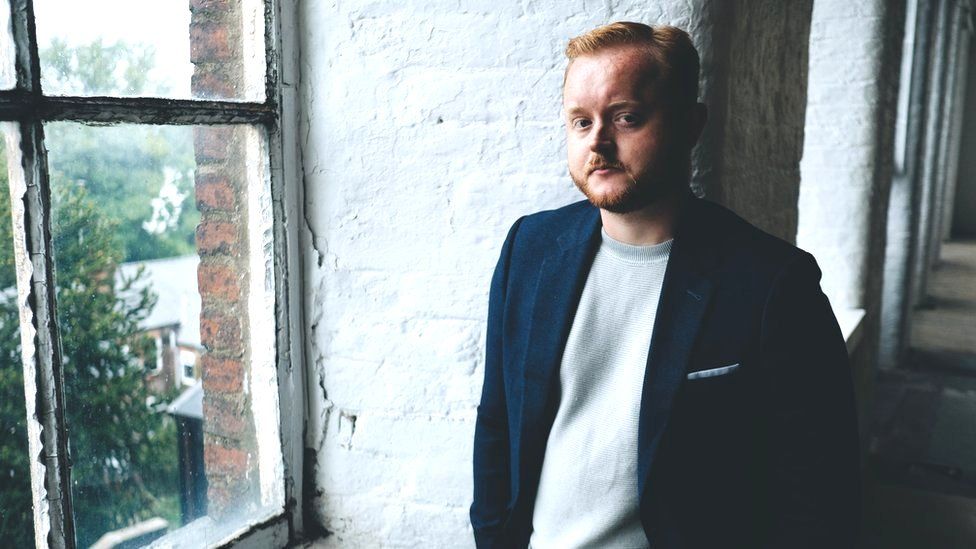
Conspiracy theorists, who claim UK terror attacks have been staged, are tracking down survivors to their homes and workplaces to see if they are lying about their injuries, a BBC investigation has found.
Martin Hibbert, who was paralysed from the waist down when he and his daughter Eve were caught in the 2017 Manchester Arena blast, told the BBC he is now preparing to bring libel action against a conspiracy theorist based in Wales.
Richard D Hall has described how he physically tracks down survivors of the attack - in which 22 people were killed and more than 100 injured - to determine whether it was faked. He says he spied on Eve from a vehicle parked outside her home.
In a video shared with his followers online, Mr Hall demonstrates setting up a camera to film Eve, now profoundly disabled and in a wheelchair, to see whether she can in fact walk.
"I'm all for freedom of speech," Martin Hibbert told me. "But it crosses the line when you're saying I'm an actor or I've not got a spinal cord injury or Eve's not disabled, she's not in a wheelchair.
"You don't know how far he's going to go to get answers."
Mr Hall suggests that those who were killed in the attack are really alive and living abroad. He also promotes theories that several other UK terror attacks were staged. A former engineer and website designer, he makes money from selling books and DVDs outlining his theories, as well as speaking at events and posting videos online. As recently as mid-October, he had more than 16 million views and 80,000 subscribers on YouTube.
When I confronted Mr Hall at a market stall he runs, he insisted I'm wrong about how he operates.
For the past five months I've been looking into conspiracy theorists who target UK terror survivors, for BBC Panorama and a Radio 4 podcast. My investigations and new research, along with the testimony of those affected, show that conspiracy theories and tactics like those deployed by Mr Hall are emblematic of a wider phenomenon that survivors and bereaved families are experiencing.
A victim of the 2017 Westminster Bridge terror attack, who has been harassed by online conspiracy trolls, told the BBC that surviving a terror attack now seems to inevitably lead to being abused.
These types of conspiracy theories, and the abuse they inspire, echo those of Alex Jones, the US host of the conspiracist show and website Infowars, who this month was ordered to pay nearly $1bn (£861,805,000) to families of the US Sandy Hook school shooting after falsely claiming the 2012 attack was a hoax.
Online abuse describing terror attacks as hoaxes, and those who were injured as so-called "crisis actors", appear to be on the rise since the pandemic, according to survivors who have spoken to the BBC.
Most of the abuse has been perpetrated online, but people I have spoken to say they fear for their safety because the abuse has also begun to affect their lives offline.
Nearly one in five people in the UK think terror survivors are not telling the truth about what happened to them, new research for the BBC suggests. A third say the pandemic has made them more suspicious of official explanations of UK terror attacks.

The survey of more than 4,000 people, weighted to be representative of the UK population and carried out earlier this month by King's College London, also suggests that 14% believe the 2017 Manchester Arena attack probably involved "crisis actors" who pretended to be injured.
Research from BBC Monitoring found that dozens of videos promoting false claims about the Manchester attack - accumulating more than 300,000 views - were still on YouTube five years after the incident. After the BBC flagged this to YouTube, the company removed Mr Hall's channel and one other that had promoted his content.
"Targeting the victims and families of these atrocious attacks is abhorrent," said a spokesperson for the company. "YouTube's hate speech policy outlines clear guidelines prohibiting content that denies, trivialises or minimises violent historical events, and we will remove flagged videos that violate these guidelines."
Martin Hibbert's lawyer, Neil Hudgell, who is preparing a libel case against Mr Hall, told the BBC: "Martin's got to the point of enough is enough. This needs tackling and to be silenced in legitimate ways."
Mr Hall's claims and tactics also include:
- Entering the workplace of Manchester Arena survivor Lisa Bridgett, posing as a customer, with the aim of secretly recording her to discover whether she's lying about her injuries
- Visiting the homes of other Manchester survivors to try to question them about whether the attack was a hoax
- Publicising the names and locations of dozens of Manchester survivors and bereaved relatives of victims in a video - appealing to his followers to send him any information they have about them
Martin Hibbert first became aware of Mr Hall's tactics when police alerted the family to allegations that he had put a camera outside the home of his daughter Eve. Mr Hall had shared a video of himself preparing a small camera strapped to a stake which he said he would use to check whether Eve really was hurt in the Manchester Arena bombing.
"I've sharpened the spike on the end so I can just stick that into the ground in order to surveil our subjects," he told his viewers, holding up a camera attached to a stick with fake foliage wrapped around it.
Eve, who is now 20, was left severely disabled after the bombing. She experienced a serious brain injury and has lost the use of her left arm and leg.
Mr Hall later said online that Eve left the house in a wheelchair, but added, "There's no evidence" that the injury was as a result of the attack.
He also documented his attempt to prove that Lisa Bridgett, who lost a finger in the bombing, was not injured either, by taking a hidden camera to the boatyard where she works.

Ms Bridgett told me: "It makes you feel very security conscious, because you just don't know who's out there and who might be lurking in a garden or standing round a corner with a hidden camera on."
Messages seen by the BBC show how online abuse, citing conspiracies that Mr Hall and others promote, have also been sent to the grieving relatives of those killed in the Manchester Arena bombing, as well as survivors of other UK terror attacks. There have been attempts by trolls online to identify where terror survivors live and work.
Mr Hall requests donations on his website and promotes an online shop where he sells branded merchandise. He also has a market stall where he sells his book and DVD about the Manchester Arena attack, along with other books and DVDs promoting conspiracy theories.
I visited the market stall to ask him questions after multiple attempts to get answers to survivors' questions.
He told me he didn't want to talk to me about the "evidence" he says he has to back up his claims, and that he doesn't trust the BBC. I asked how he feels to be profiting from the worst day of these survivors' lives.
"If you read my book, all the answers are in there," he said. When I told him there is no evidence in his book, he told me I'm wrong.
He refused to address questions about whether he really believes UK terror attacks were staged and if he understands the harm his conspiracy theories and tactics cause to the survivors of these attacks.
After my visit, I wrote to Mr Hall again but he didn't respond. Since then he has added a series of disclaimers on his website saying that he does not "advocate that viewers of this website make contact with alleged terror attack victims, either online or in person".
He has also posted a new video, in which he says he did not put a camera outside the home of Eve Hibbert, but admitted to leaving "a camera rolling" in his van which was "parked in a public place".
He says he has made "polite door to door inquiries in order to gather evidence, which is a perfectly legitimate activity when doing research", and that his appeal for information from the public does not make him "responsible for hateful messages sent by people".
But he held firm to his "opinion [that] there has been no satisfactory evidence presented to the public, which proves that the Manchester arena incident was not staged".
Subsequent to the publication of this article, Mr Hall removed several videos from his website. A comment added to his homepage said: "In response to recent media coverage, if any person is upset by what they have seen, Richard D Hall apologises for any upset caused."
To try to find out more about Mr Hall and what motivates the people who push these conspiracy theories, I spoke to an insider who used to appear in Mr Hall's videos. He has insight into how this conspiracy industry works.
Neil Sanders said he doesn't share Mr Hall's views on the Manchester Arena attack. He believes it is the fans who are shaping the trajectory of a conspiracy theorist like Mr Hall, who used to focus on theories about UFOs before starting to push claims about "fabricated terror". In fact, Mr Sanders said he is sure that when he and Mr Hall had discussed the conspiracy theories that took off after the Sandy Hook school shooting, Mr Hall had dismissed them as nonsense.

But he said the more Mr Hall has become embroiled in this world, the more he appears to have bought into these conspiracies. It is the more sensational theories which are the ones that "sell", Mr Sanders explained, adding that Mr Hall's talks in pubs and other venues up and down the UK in recent years have been packed.
Mr Sanders says he doesn't support conspiracy theories that UK terror attacks were staged.
The King's College research suggests that four in five people do recognise that serious terror attacks have occurred in the UK.
But, when asked specifically about the Manchester and 7/7 bombings, a significant minority - one in seven people surveyed - have doubts about whether those attacks even happened at all.
And more than one in 10 of those surveyed think the Manchester Arena attack was a hoax.
"This not only disengages people from society generally. For that small minority who get really caught up in conspiracies, it can actually affect their behaviour," explained Prof Bobby Duffy, who led the research. He feared that those who believe these theories are more likely to target survivors with abuse.
The research distinguishes between those who believe terror attacks, such as the Manchester Arena bombing, were a hoax, and those who aren't sure about the truth of these attacks.
Prof Duffy describes how anxiety, uncertainty and social media habits can all tip someone from simply questioning events, to arriving at more extreme beliefs.
Of the 14% of those surveyed who believe "crisis actors" were involved in the Manchester Arena attack, just under half say the messaging app Telegram is a key source of information on news and events for them. They were also more likely to be under 24 years old and not to have voted in the last election.
The research suggests that the pandemic has created a "gateway" for these conspiracies, with a third of people surveyed saying it has made them more suspicious of official explanations of terror attacks. Prof Duffy said he expects the current economic climate to exacerbate this tendency.
One of those who admits to engaging with such online conspiracy theories is Alicia, who said she lost faith in the government during the pandemic. She said she struggled during lockdown and now she's struggling with the cost-of-living crisis. Social media is the main place she turns to for updates and information.
The mental health worker had said online that she was looking forward to visiting his stall.
"People don't feel safe any more because they've got nobody to look to who tells us the truth. That's quite scary, actually."
She told me that she doesn't want it to be true that the Manchester Arena bombing was a hoax, but it really frightens her that it could be - and she's not sure what's true any more.
When I told her how I've interviewed survivors who were injured in the attacks, and how they have been deeply hurt by Mr Hall's false claims, she appears genuinely shocked.
Alicia says she has never sent out online abuse based on these kinds of conspiracy theories. But there are plenty who have.
Travis Frain was trolled by online conspiracists after he was filmed just after being hit by a car during the 2017 Westminster Bridge terror attack. Mobile phone footage of him standing on the bridge after breaking his leg - adrenaline delaying the pain - inspired a wave of online abuse.

He received the first message about the attack in hospital the next day.
"We know the attack was staged. I hope they hang you," it read.
In the months after the attack, Mr Frain flagged videos and posts to social media sites using their reporting tools, but he said nothing happened until his lawyer wrote to them.
YouTube did then take down various videos which promoted the theory that he was a "crisis actor", but he said he has had only varying degrees of success with other major social media sites.
Mr Frain reported the abuse to the Metropolitan Police. No-one has been charged.
He said he felt "powerless" because people don't realise how viciously and frequently terror survivors are trolled online.
It's for that reason these survivors have decided to speak up - and that some are looking to the courts to hold the conspiracy world to account.
From BBC
